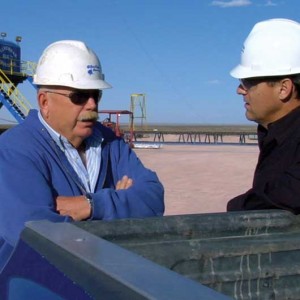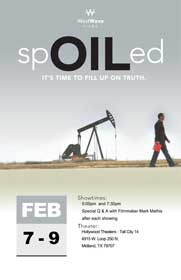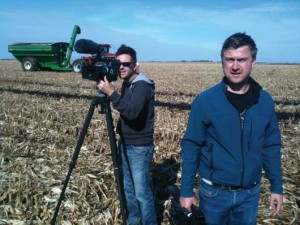A new feature-length film documentary on the oil industry answers oil’s critics but goes far beyond to supply a much-needed reality check, not just for America but for the world.
The early buzz—at least within the Permian Basin—for the just-released feature length film documentary SpOILed is enthusiastic. Filmmaker Mark Mathis will be in Midland Feb. 7-9 for public screenings of the movie.
Mathis and his team started in October to host showings of the film in various cities. He told PBOG in January that audiences in about a dozen locales had seen the movie thus far, from smaller communities such as Farmington or Hobbs, N.M., and Santa Maria, Calif., to medium-sized cities such as Albuquerque, to large metro areas such as Denver.
“SpOILed was on three screens [at a multiplex] in Denver and also was shown at the Petroleum Club there,” Mathis said. “Typically we will show it in the middle of the week. We are getting very large audiences, typically, and in many cases we sell out. So it’s very common for us to show it on Wednesday night at 7:30, and to put 200 in the theater, in a 24-screen multiplex. At times we have had more people watching our film in the multiplex than were watching all the other films showing there, combined.”
Mathis will answer questions from audience members after each screening in Midland. The film did show privately—not commercially—in Midland in late 2011 in a fundraiser event. Mathis said that the funds raised at that event made it possible for him to bring the film back to the city in February for public viewing.
SpOILed explodes the myths that have enveloped the oil and gas industry, cutting through to the truths that most need telling. Incorporating clips from national news broadcasts and high-level public pronouncements, the film establishes the public perception of oil and its demonization within certain sectors, but sifts down to the facts that establish oil’s vital and irreplaceable position in worldwide economies. No other source of energy can maintain our modern-era quality of life, at least not within our lifetimes, and facing this reality is the first step in coming to terms with one of the most profound truths of our era.
As Jim Henry, of Henry Petroleum, remarks about the film:
“This is an excellent and informative film about the misconceptions the public has about the oil industry. How “spOILed” we are with our free use of petroleum products with little regard for the effort and sacrifice people in the oil industry made to produce these products.”
Larry Scott is one of a handful of oil and gas professionals with Permian Basin ties who are seen or cited—or both—in the film. Scott is owner and president of Lynx Petroleum, in Hobbs, N.M.
Scott described the film as “fairly presented.” He said that Mathis and his film crew followed Scott and his team around the Hobbs area for more than a day.
A portion of the film is devoted to the question of “peak oil,” which Wikipedia defines as “the point in time when the maximum rate of global petroleum extraction is reached, after which the rate of production enters terminal decline.” Peak oil is a critical concept for it marks the point at which global shortfalls and shortages begin. Experts cited within the film pinpoint “peak oil” at anywhere between right now and a point within the next few years.
Saying that he thought the treatment of the “peak oil” question “might be a little pessimistic,” Scott nonetheless praised the film.
“I thought that the portrayal of our government’s elected officials was fairly accurate in that the policies that they are currently advocating don’t realistically address the energy needs of our country,” he said. “I think that that was accurately portrayed.”
Scott remarked that he knew Mark Mathis from Mathis’ work with the Independent Producers Association of New Mexico. “I consider him a friend,” Scott said. “We get along fine.”
Jeff Harvard, manager of Harvard Petroleum Company LLC, knows Mathis from having worked with him in the past. Harvard Petroleum is based in Roswell, N.M.
“Actually, we hired Mark originally to teach us how to talk to the media, Harvard said of Mathis, a fellow New Mexican. “He [Mathis] was a consultant and also the author of a book entitled How to Tame the Media Beast. We had him talk to our membership. He’s a nice, very likeable guy. We became friends. I was president or vice president of the organization [Independent Petroleum Association of New Mexico] then and we got to know him and actually hired him to help us with some of our media publications and infozines—the material that we put out for our state government. It’s to explain to our legislature how important our industry is to the state.

Mathis interviews “Bullet” Bean, of Silver Oak Drilling. Bean: “It takes a special breed of people to do this kind of work. Because you’re in the bare elements all the time. It’s either too hot, too cold, windy, snowing, raining…”
“As he [Mathis] states at the outset of the movie, he was not [fully] aware of the importance of our industry and what it really does until he became involved with the IPANM.”
Permian Basin producers comprise a large portion of the IPANM membership. New Mexico has two large oil and gas producing regions: the northwest part of the state and the southeast part. The northwest part lies within what is known as the San Juan Basin, and the southwest part is New Mexico’s share of the Permian Basin.
“What brought the movie about was his involvement with IPANM,” Harvard said. “And his recognition of how little the public understood about the importance of oil and gas to their day-to-day lives.
“He worked with us for a while and then went into additional [outside] media work and then got involved in the production of the movie Expelled, with Ben Stein. From there, he pursued the making of this movie, SpOILed. It is an excellent movie that is way, way past due for our industry. It does a really good job of addressing the importance of oil and gas to our nation as well as to the world.
“Our biggest shortcoming as an industry has been the failure to educate the
public on the importance of our industry and what it means to our daily lives,” Harvard concluded. “And I think this film does a good job of exposing that. The importance as well as the shortcomings of our not having done that. We in this industry are too busy doing our job to tell other people what we actually do.”
Mathis takes pains, in the film, to make clear that “big oil” had no part and contributed no backing to the creation of SpOILed.
“This was something that came about as my creation,” Mathis emphasized. “I am not from the oil and gas industry. I have not worked in oil and gas. I am a media guy and a consultant and someone who by coincidence and happenstance got pulled into the energy sector and into documentary film.
Not only did Mathis hope to answer some of the anti-oil allegations coming from today’s powerful Green Lobby, he also hoped to tell some truths about so-called “green energy sources.”

“Twenty percent of your projects will ultimately determine 80 percent of your revenue. You have to be an eternal optimist. You have to be able to let that last dry hole go.” –Larry Scott, owner, Lynx Petroleum.
“I think they [the Green Lobby] are a big part of the problem because a lot of these so-called green energy sources are not green at all, and on top of that, they don’t work economically,” Mathis said. “I am not against anything that would make us more efficient. And cleaner. I think all of us are in favor of that. But we have to examine what is true and what is real. When it comes to something like wind energy, for instance, people need to understand it is a very poor source for generating electricity. A compelling point that I like to bring out is one I got from Robert Bryce, who says—and this sounds like heresy—but he says that oil is green. If the definition of green is something that keeps your environment clean, and that is efficient, then oil is green.
“Besides that, there is no real alternative to oil, and that will be the case 50 years from now, and maybe forever. Do we need to figure out a way to use less oil? Yes. That is a good thing. Here I am speaking from the same page as an environmentalist on this issue. But what I throw into the mix that is different from them is this: What is realistic here? What does it take? That is where some of the big problems come into play. Let’s look at the facts and at what’s do-able. Let’s look at what’s possible. Let’s face the issue in a very real and pragmatic way. I think that’s what a lot of folks in the Green Lobby aren’t doing.”
Mathis said the most common reaction he is hearing from viewers of the film is that it is balanced in its views and that it takes a pragmatic approach to its subject matter.
“Over and over again, they say that it is so clear that this film is simply trying to point out what the reality is with regard to oil, and that we are not trying to drive some kind of agenda here,” he said. “That they can see that we are simply trying to wake up the public to the seriousness of this issue. The other thing that people like is that our film has a creative edge to it, and some comedic breaks in it—some humor and entertainment value.”
Though most of the camera time is devoted to locations outside the Permian Basin, a significant portion of the film was shot in the Permian Basin or otherwise involved individuals who have been active in this region.
“Partly that was to get the independent operator’s perspective,” Mathis said. “So much of the oil that is produced in this country and is used by all of us is produced by these small independents that employ 6, 8, 10, 12 employees. You add them together and that is the largest chunk of the oil that turns into gasoline and diesel and that makes cell phones and paint and plastics.
“In talking to these small operators and hearing the challenges they face, it is inspiring. When you consider all they are up against—the level of regulations they have to deal with, and the way a bureaucrat can dramatically increase their cost of doing business with just a stroke of a pen—well, you just wonder who would subject themselves to this. This is an incredibly difficult working environment. Just the fact that they know that 20 percent of their projects are going to [have to] produce 80 percent of their revenues. They know this ‘going in,’ and then they have very costly operations themselves. It’s a matter of getting the wells completed and bringing the product to market. It’s all very costly and high risk, and then you throw in the regulations. And the intrusions into their business by politicians. And then most people think they are the bad guys. It makes you wonder who would do this kind of work.
We need to change our national policies, Mathis said.
“We need to make domestic production a priority,” he concluded. “This is for the people of America—that’s who it is a priority for. This is about us. It is about how we are going to live over the next many decades.”
For more information on the film, go to spoiledthemovie.com.











